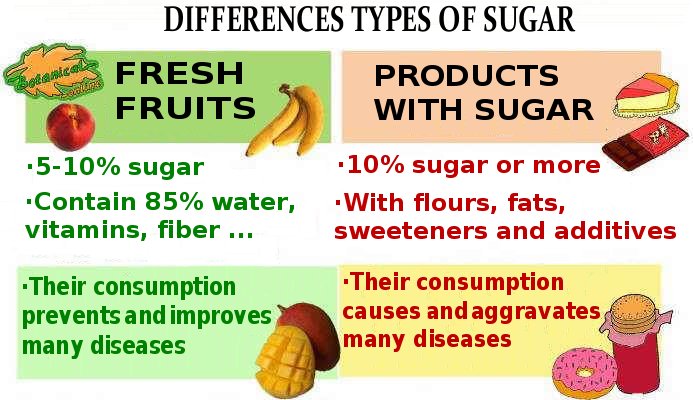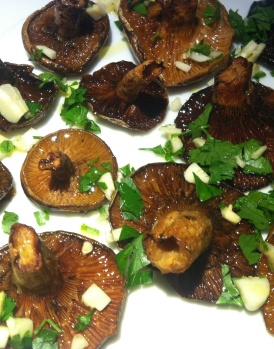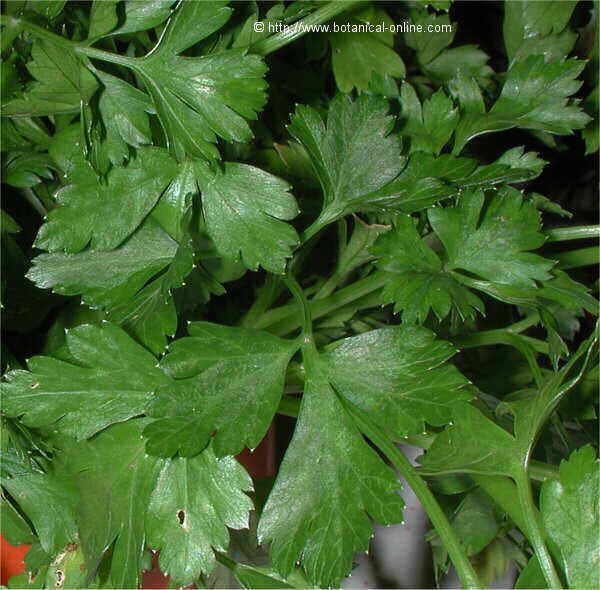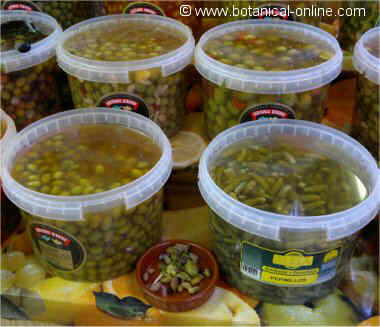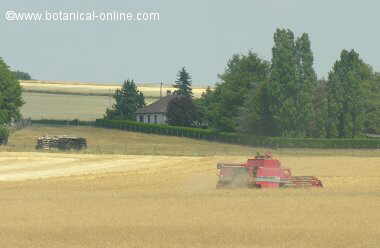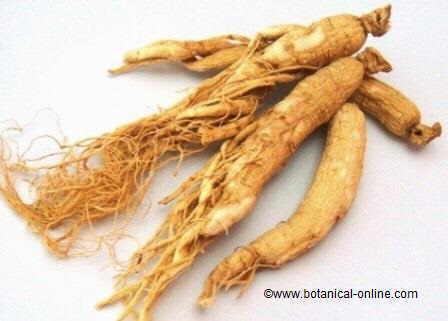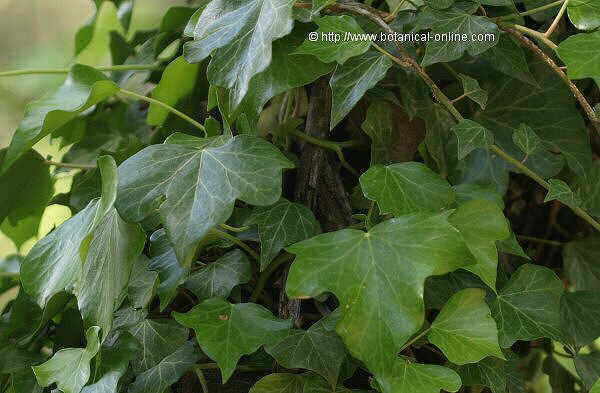Contents
- 1 MENOPAUSE DIET
- 1.1 IMPORTANCE OF FOOD DURING MENOPAUSE
- 1.2 Diet for menopause
- 1.3 Vegetables and fruits for menopause
- 1.4 Ingestion of liquids must be abundant in menopause
- 1.5 FOOD SPECIALLY RECOMMENDED FOR MENOPAUSE
- 1.6 Soy and foods rich in phytoestrogens for menopause
- 1.7 Other plants that contain phytoestrogens
- 1.8 Foods rich in calcium for menopause
- 1.9 Foods rich in boron for menopause
- 1.10 Foods rich in Vitamin C
- 1.11 WHICH FOOD IS NOT GOOD FOR MENOPAUSE
- 1.12 Bad fats for menopause
- 1.13 Limit the consumption of sugar
MENOPAUSE DIET
IMPORTANCE OF FOOD DURING MENOPAUSE
Diet for menopause
Diet plays a fundamental role in the control of the negative symptoms of menopause.
A suitable diet will help to balance feminine hormones and to prevent a series of diseases to which the woman is more prone during this sexual period.
Vegetables and fruits for menopause
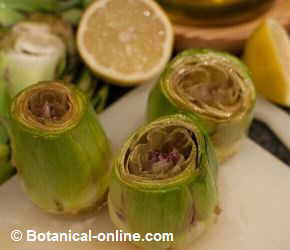 Artichokes are suitable for menopausee
Artichokes are suitable for menopausee
A diet rich in natural vegetal food, with many vitamins, fiber and minerals will help to avoid the tendency to swelling and will avoid the appearance of metabolic diseases such as obesity, cholesterol or heart problems.
This type of foods can help to avoid the weakening and fall of the hair, dryness of the skin, night hot flushes, vaginal dryness, or depression episodes.
Ingestion of liquids must be abundant in menopause
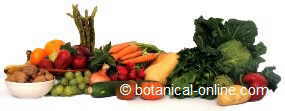
Diet for menopause must include lots of vegetables
They can be obtained from fruit juices and especially from mineral water. Water drains your body and eliminates toxins. It also cools you, helping you to lower your high body temperature when you feel hot flashes can occur.
Precisely to avoid these unpleasant symptoms, it is not advisable to drink alcohol or stimulant drinks.
FOOD SPECIALLY RECOMMENDED FOR MENOPAUSE
Those plants rich in these components help balance female hormones. Among the plants richest in these compounds. some deserve special attention:
Soy and foods rich in phytoestrogens for menopause
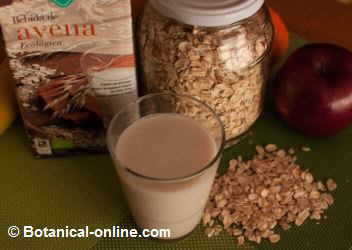 It is recommended to introduce vegetable drinks in stead of milk because they are higher in magnesium and contain the same amount of calcium.
It is recommended to introduce vegetable drinks in stead of milk because they are higher in magnesium and contain the same amount of calcium.
Studies of Asian women have shown that soy isoflavones (especially genistein and daidzein) have a positive effect on menopausal symptoms because these compounds have plant phytoestrogenic properties that reduce excess of estrogens in women with premenstrual symptoms and help to balance the lack of estrogen during menopause.
This involves both a reduction of bad cholesterol in the blood (LDL) and an increase of good cholesterol (HDL) which benefits blood circulation and prevents heart problems. It also decreases the risk of breast cancer in women with excess of estrogen.
On the other hand, it prevents the occurrence of many symptoms of menopause such as hot flushes, vaginal irritation, irregular periods, etc. or those diseases that are more likely to develop after the loss of menstruation: the loss of bone mass or osteoporosis and heart disease.
It was found that Eastern women, who have in soy one of the main sources of food, have a much lower incidence of these diseases. Studies conducted at the University of Illinois in postmenopausal women showed that those who were subjected to a soy diet not only managed to prevent a reduction of bone mass loss but even increased by 3%.
While the ones that did not ingest this legume, lost it a bit. You can eat soy in many ways, both the vegetable and its derivatives, among which tofu or soy dextrin are very suitable.
The latter is used as a substitute for meat because of its richness in protein and the similarity in texture.
Other plants that contain phytoestrogens
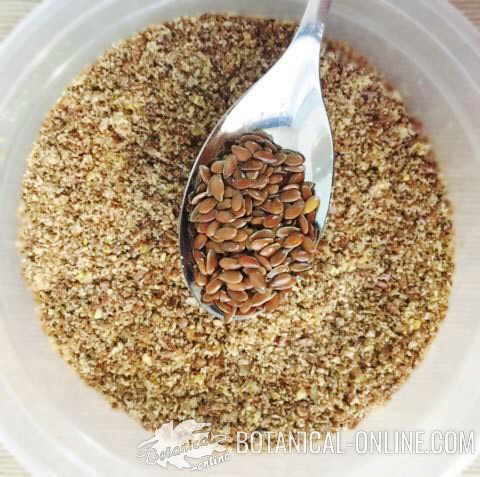 Flax unsaturated acids protect women in menopause
Flax unsaturated acids protect women in menopause
- Alfalfa (Medicago sativa) As soy, it is rich in genistein and may help improve the symptoms of menopause. The best way to eat it would be through its sprouts.
- Flax (Linum usitatissimum) Wealth in alpha-linolenic acid and other unsaturated fatty acids in flaxseed protects the heart, preventing angina, arteriosclerosis and diminishing cholesterol. (Eat bread or preparations that contain seeds of this plant)
Apparently the ingestion of food containing these acids helps prevent tumors in the breast and skin. It is been considered the possibility of lignan phytoestrogens to be effective in reducing breast cancer because of their antioxidant, antiestrogenic and antitumor properties.
Wild yam and the diosgenin?
The U.S. has a potato vine that has been commonly used by natives to treat a variety of disorders, mainly intestinal colic, hence they knew her as “The root for colic”.
Subsequently, it was used to treat menstrual disorders, but it was the end of the twentieth century when diosgenin was obtained from it, to treat women’s problems. Since this type of yam plant that has more of diosgenin some scholars suggest that eating this tuber may increase the level of estrogens.
However more studies suggest that the human organism does not possess the appropriate enzymes to convert diosgenin into a hormone.
Therefore, both the ingestion of extracts of diosgenin as the ingestion of wild yam root would have no special effect on menopause or other female problems. (We must distinguish this kind of yam from sweet yam or common yam (Dioscorea bulbifera)
– Other foods that contain phytoestrogens include: sweet yam, celery, watercress, apples, dates, pomegranates, cabbages, cauliflower, etc.
Foods rich in calcium for menopause
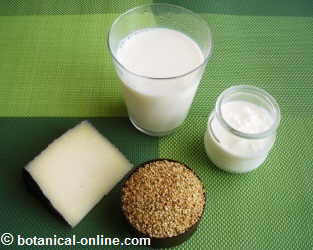 Calcium food must be present in the menopausia diet
Calcium food must be present in the menopausia diet
The loss of calcium that takes place at this time can be compensated with food rich in this mineral.
Rich calcium foods are vegetables such as garlic, onions, cabbages, fruits, such as chestnuts, nuts, coconuts, figs, especially dry figs, apples, bananas, avocados, or almonds,
(Raw bran used to activate the depositions inhibits the absorption of calcium!!!. It is best to take foods like whole grains (oats are richer in calcium than wheat) or dry fruits (dry figs or nuts are ideal to prevent osteoporosis)
Both previously mentioned foods constitute outstanding examples to expel feces without taking raw bran due to their fiber wealth.
Foods rich in boron for menopause
Boron helps to increase the level of estrogens in the blood. Strawberries are the food with the higher content of this mineral.
Other foods of vegetal origin that contain it are: tomatoes, apples, pears, peaches, cherries or asparagus.
Foods rich in Vitamin C
Its antioxidant properties help prevent the degeneration of the body and keep skin and hair in good condition. (More information on this vitamin and the foods contains that it)
WHICH FOOD IS NOT GOOD FOR MENOPAUSE
Bad fats for menopause
At the same time, we will have to avoid greasy foods, especially those containing saturated fats, which intake alone can increase your weight or facilitate the appearance of cholesterol. Whole milk or whole dairy products are also not recommended. It is best to take low fat foods.
It is important to take unsaturated fats, such as olive oil or to acquire these principles from other vegetal such as nuts or almonds, rich in unsaturated fatty acids Omega-3 that prevent the formation of thrombi in the blood and the onset of cardiovascular problems.
To avoid hot flushes, women would have to increase the number of meals and decrease their amount. The ideal would be to distribute food in five or six meals a day. Moreover, this would help to maintain more stable blood sugar levels to avoid too exaggerated increases or decreases which may cause dizziness or sudden mood changes.
Limit the consumption of sugar
To make this effective, you should limit the consumption of sweets or desserts, replacing the intake of these simple sugars with more suitable ones. A contribution of more complex carbohydrates would be more appropriate.
These are obtained from plant foods like whole grains, vegetables and starches. Energy obtained from the ingestion of fruits is considered very suitable.
![]() More information on menopause.
More information on menopause.

